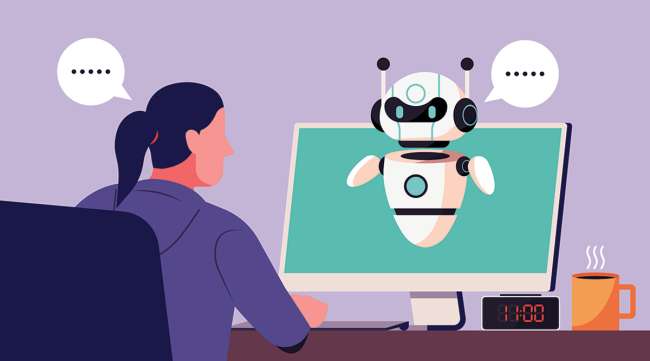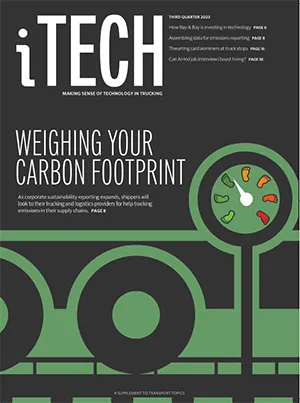Using AI and Video to Make Job Interviews More Efficient

[Find the latest in trucking technology: Explore this quarter's issue of iTECH]
A novel idea just a few years ago, AI-powered video interviewing of job applicants has quickly matured into a mainstream option for trucking and logistics companies looking to streamline the hiring process — and bring in new efficiencies to boot.
One of the key advantages of AI-powered video interviewing is that it offers job applicants the ability to engage in a video interview for a job at their convenience.
Simultaneously, the tech also enables trucking firms to delegate initial job interviewing responsibilities to a machine, freeing up human resources to engage in more profitable endeavors.
“We recommend video interviews early in the funnel, but always want an in-person interview to keep the personal touch,” said Scott Rea, president of AvatarFleet, a developer of recruitment and personnel management software for the transportation industry.
Plus, in many cases, both job applicants and employers feel hiring by AI can be much fairer given that each candidate experiences the exact same interview experience. With a machine doing the interviewing, each job candidate does not have to worry about any hidden prejudices or irrational preferences that could be harbored by a human interviewer.

Dysart
“We’re helping to ensure interviews are standardized across candidates,” said Sharon Hunt, vice president of product management of Clovers, a provider of AI-powered video interviewing services.
The goal is to create a level playing field and provide organizations with a more diverse pool of talent, said Lindsey Zuloaga, chief data scientist at HireVue, another AI-powered video interviewing company.
“Deploying AI correctly and ethically powers a significantly more consistent, less biased, more engaging screening process for recruiters and candidates alike,” she said.
Of course, AI-powered video interviewing does not replace the need for HR and team managers to meet with job candidates personally before they’re hired.
And given that AI is programmed by humans who are sometimes less than fair, transportation companies will most likely want to tweak their AI interviewing software to ensure that it is as impartial as possible.

Jazrawy
“The advantage to using AI as an additional tool — not a replacement — is that it provides another ‘viewpoint,’ ” said Jane Jazrawy, CEO of online driver training provider CarriersEdge. “When a human is biased, the AI may counteract that bias. When the AI is biased, it can be corrected.”
Bottom line: AI-powered video interviewing can undoubtedly serve as a powerful supplement in recruiting, offering HR and managers a new, in-depth and thoroughly unique perspective on a potential hire.
As you might suspect, variations on the concept of AI-powered interviewing abound. But the common thread that runs through all is the simple experience of a job applicant — usually sitting in front of a webcam or similar video camera — answering questions posed by the AI and sometimes engaging in games or other activities that help the AI better assess the applicant’s skills. All the while, the AI operates in the background, observing facial reactions, making note of word use and looking for other job candidate characteristics that have been programmed into the system for observation and analysis — or added to the system by a specific company’s HR or managers. Once the interview is concluded, the HR department gets a recorded video of the entire interview. Plus, they also get an analytical report from the AI on the candidate’s strengths and weaknesses, as well as the AI’s judgment on how the candidate ranks against all other candidates applying for the job.

Q3 iTECH
►Industry Tackles Carbon Tracking
►Fleets Test Carbon Capture System
►UT Unveils Fleet Sustainability Index
►Card Skimming at Truck Stops
►Q and A: Bay & Bay's Wade Anderson
►Dysart: Using AI for Job Interviews
►Clevenger: Roads to Decarbonization
Explore the Issue!
Unsurprisingly, opinions vary on the potential value of this technology. Some in the trucking industry are resistant to the notion of relinquishing even part of the recruiting process to a machine.
“At this time, I would say I’m skeptical,” said Jay McElroy, president of McElroy Truck Lines. “I agree that machine decisions are very exact, but I would be a late adopter.”
Others highlighted the value of human intuition during the interview process.
“I don’t think a computer is capable of picking up the subtle clues that we can pick up just by having an informal conversation with an applicant,” said Elizabeth Billups, marketing and recruiting director at Viessman Trucking. “On top of our ability to simultaneously collect and analyze data, we humans have a superpower [that] computers will never have in our ability to use our intuition to assess how well a candidate will fit the job and our culture.”
Keith Stelzer, vice president of safety and recruiting at Paper Transport, agreed. Human to human, Paper Transport can much more easily and effectively assess a driver or other recruit — as compared to relying on an AI machine, he said. Moreover, Stelzer says his company’s HR department is much more accomplished at communicating the company’s culture, value and opportunities.
“As of right now, that works really well,” Stelzer said. “Therefore, we have not looked into AI to evaluate video job interviews.”
Meanwhile, other industry players are intrigued by the inherent advantages of AI-powered video interviewing — as long as the tech is embraced with a healthy dose of caution.

Beeson
“I would agree it makes interviewing easier, but it does have drawbacks,” said Kari Beeson, vice president of risk management and recruitment at Transervice.
She said AI can be used to conduct pre-screening interviews and help companies streamline the recruitment process, but expressed concerns that the technology could unfairly penalize candidates if it can’t understand the person’s speech.
Lisa Shuster, chief people officer at iHire, a recruiting firm often used by transportation companies, is a bit bolder in her willingness to try the tech, even as she intends to exercise caution.

Shuster
“The time for learning and experimentation is now, and those who don’t begin to embrace these technologies risk being left in the dust by their competitors,” she said. “But it’s also key to understand the limitations.”
For those open to the idea of giving AI-powered video interviewing a trial run, here’s a representative sampling of service providers:
•Interviewer.AI: Interviewer.AI relies on AI-powered expression and voice analysis to render judgments on applicants interviewed by its system. The algorithms look for communications skills, professionalism, energy level, sociability, project management skills, teamwork and time management. HR and managers can add their own questions to the system to ferret out additional skills and qualities they’re seeking. And the videos are stored for easy replay by HR or managers if needed. Interviewer.AI also enables users to customize the way the system ranks candidates. The system integrates easily with meeting schedulers commonly used with Google Meet, Microsoft Teams and Zoom.
• Clovers: Clovers structures its AI video interviewing so the experience “feels like” a typical video meeting, all the while pulling out key insights for HR and managers. The company also takes great pains to ensure its interviewing process is a positive experience for applicants and is inclusive for all applying. Clovers is designed to integrate seamlessly with commonly used video meeting software such as Zoom, Google Hangouts and Webex.
• HireVue: HireVue asserts that with its AI-powered video interviewing system, HR and managers will be able to focus on AI-gleaned insights on applicants’ skills, behaviors and competencies rather than being distracted by how an applicant is dressed or what keywords they used on their resume. With HireVue AI interviewing, consistency is the overarching goal. Every candidate responds to the same set of questions, plays the same games designed to analyze skills and enjoys the same amount of time to prepare and answer questions.
• MyInterview: With AI-powered video interviewing from MyInterview, each applicant video is analyzed for soft skills, personality traits and keywords in the same exact way, ensuring each applicant gets a fair shot at becoming your next employee. The system is also designed to enable a team of people from HR or management to review and comment on a recorded applicant video together. And MyInterview makes it a snap to schedule and engage in a follow-up, live interview with pre-screened candidates that pass the first AI evaluation.
Joe Dysart is an Internet speaker and business consultant based in Manhattan. Voice: (631) 233-9770. Email: joe@customtechadvisor.com. Web: www.dysartnewsfeatures.com.
Want more news? Listen to today's daily briefing below or go here for more info:




